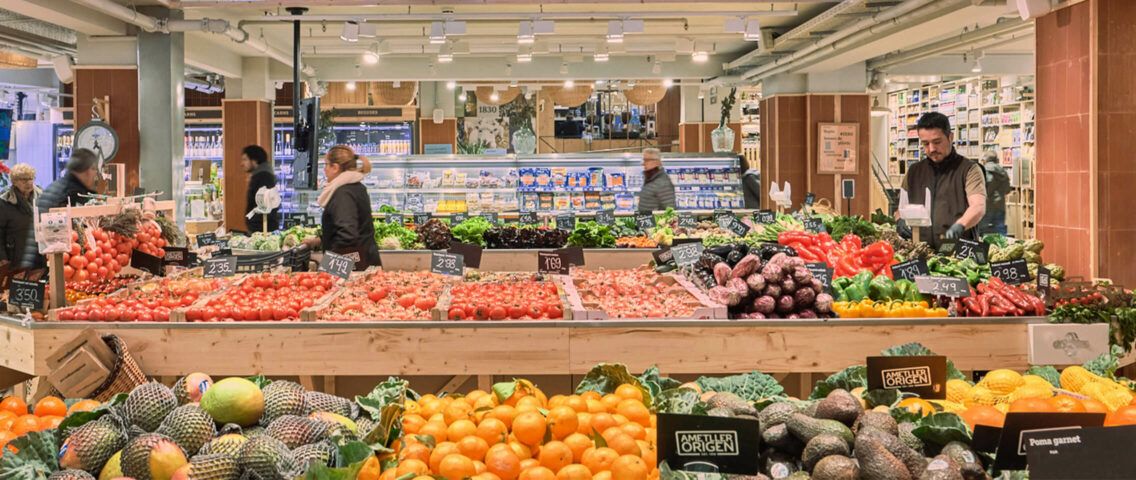Based in Catalonia, Spain, grocery retailer Ametller Origen Group has become the region’s benchmark for high quality fresh and packaged foods. The company’s mission is to promote a healthy and sustainable lifestyle, providing their shoppers with easy access to nutritious products.
Founded in 2001, Ametller Origen maintains farmlands throughout the Mediterranean region as well as a centralized kitchen that produces their packaged products. This vertically integrated structure allows them to control the quality of their fruits, vegetables, and packaged goods from the point of origin all the way to their stores.
The Challenge: Decentralized, Manual Processes Caused Suboptimal Results
In recent years, Ametller Origen has experienced consistent year-over-year growth of about 19%, raising concerns about the company’s ability to scale their supply chain processes quickly and efficiently enough to keep pace. This rapid growth, combined with the COVID-19 pandemic’s explosion in online sales, made clear that the retailer needed greater inventory control as the complexity of their supply chain grew.
Ametller Origen sought an advanced supply chain optimization solution that could:
- Introduce automation into their supply chain planning processes
- Centralize store replenishment and ordering processes
- Increase on-shelf availability
- Reduce inventory levels
- Reduce spoilage rates for fresh goods
After evaluating a range of potential solutions, the grocer selected RELEX Solutions to provide integrated demand forecasting and replenishment. They chose to partner with RELEX not only because of the sophistication of the AI-driven technology itself, but also due to the company’s long experience and track record of success within the grocery sector, specifically with fresh product optimization.
Centralized Replenishment for Improved Availability, Inventory Levels, and Spoilage
Results at a Glance:
- 12pp increased availability for non-perishables and 4pp for refrigerated goods
- 9pp inventory reduction for non-perishables and 24pp for refrigerated goods
- 14% increase in non-perishable sales
- Significant reduction in fresh spoilage
- Increased automation throughout unified supply chain
Ametller Origen and RELEX began their partnership in August 2019 with a pilot project for demand forecasting and replenishment in one store. After just three months, Ametller Origen saw excellent results, including a 10% increase in product availability, 13% inventory reduction, and a 30% reduction in fresh spoilage. Based on the success of this pilot, the company began a full rollout of the RELEX solution to all stores and distribution centers across the Catalan territory.
The RELEX implementation drove organizational change throughout Ametller Origen, leading to several critical improvements:
- Centralization and automation of store replenishment and assortment planning: Where processes were once decentralized and highly manual, with each store manager deciding what and how much to buy, RELEX has centralized and automated assortment management and store replenishment, driving improved inventory control and higher efficiency.
- Improved data quality: Improvements to the quality of their master data enabled RELEX to automate and improve processes such as new product management, promotion planning, spoilage projections, and more.
- Improved communication and processes: Ametller Origen implemented new, more collaborative inventory management processes to ensure high inventory quality, including checks for empty shelves and stockouts, improved management of fresh and ultra-fresh products, and close tracking of daily spoilage levels.
- Flexibility and adaptability for COVID-19 impact management: By leveraging the advanced analytics of RELEX’s “event management” capability, Ametller Origen was able to successfully manage the demand impact of the pandemic with speed and agility, adjusting sales forecasts to quickly adapt to 400% demand increases in some categories.
As a result of these improvements, the grocer was able to achieve significant improvements to key KPIs. Ametller Origen has improved in-store availability by 12pp for non-perishable items and 4pp for refrigerated goods while reducing inventory levels by 9pp for non-perishables and 24pp for refrigerated goods. They have also driven a 14% increase in non-perishable sales.
Finally, Ametller Origen has achieved a significant reduction in their fresh spoilage rates—an area of improvement central to the grocer’s commitment to sustainable business practices.
“We are making our way toward CO2 neutrality by 2027,” explains Roberto Gómez, Chief Operations Officer of Ametller Origen. “RELEX’s smart replenishment solution has enabled us to significantly reduce our environmental impact through more efficient processes. The high quality of their demand forecasts has led to a reduction in fresh produce shrinkage, improving sustainability throughout our supply chain. We look forward to building on this strong start to continuously improve our sustainability efforts while improving key outcomes throughout our supply chain.”
